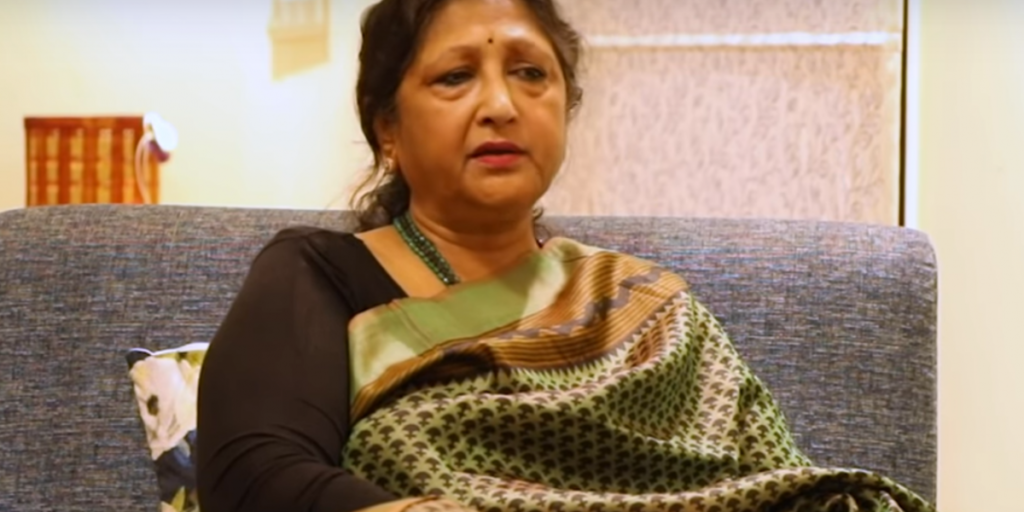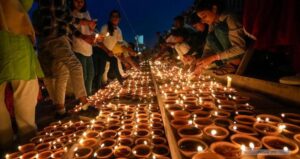Arfa Khanum Sherwani interviews Justice Anjana Prakash
[The nomination of former chief justice of India Ranjan Gogoi as a member of the Rajya Sabha has come under criticism of from judges and political parties. It is even alleged that he was bestowed the favour for giving pro-government verdicts. Arfa Khanum Sherwani speaks to former judge of Patna high court Anjana Prakash on the subject. The following are edited excerpts from the interview.]
In the past, two judges – former chief justice Ranganath Misra and justice Baharul Islam – have been inducted to the Rajya Sabha. Therefore, some people are arguing that there is nothing wrong with Justice Ranjan Gogoi’s nomination to the Rajya Sabha. What is your opinion?
Everything right or wrong is contextual. If something wrong has happened in the past, it does not mean that we continue doing wrong. Baharul Islam’s nomination to the Rajya Sabha was for different reasons.
As far as Ranganath Misra is concerned, to the best of my knowledge, he was taken on board a commission a long time after his retirement. He exonerated some Congress members and was in turn made an MP.
The thing is that if something like this happened before, it does not justify the nomination of Justice Gogoi.
Do you mean to say that since it is public knowledge that the Congress had earlier nominated two judges in return for favours, the Modi government too should make it clear which verdicts in favour of the government have earned Justice Ranjan Gogoi this nomination to the Rajya Sabha?
Let’s leave aside the matter of reward for a while. In my opinion, Justice Ranjan Gogoi should not have been nominated to the Rajya Sabha.
Allegations of sexual harassment were made against him by a subordinate female staffer. The Supreme Court suspended the woman, but she was later reinstated. Since the woman has been reinstated, it means that she was right, which means that Justice Gogoi was wrong. If that is the case, should Gogoi have been nominated to an institution like the Rajya Sabha. Should a person with such a tarnished character be sent to the Rajya Sabha?
Does it mean that you do not believe that Gogoi is here to bridge apparent ‘gaps’ between the judiciary and the legislature?
To reward Justice Gogoi for mending relations between the judiciary and the legislature does not make sense. That too, by nominating him to the Rajya Sabha, where only respected and sensible people are elected. How will he fit in there?
He was the chief justice of India. Don’t you think he is accomplished?
No. Not at all. His character is so tarnished that, in my opinion, he doesn’t deserve it at all.
It is a question of basic moral discourse, whether someone who does something evil and then takes advantage of it should be nominated to a reputed institution in which only educated and intelligent people participate.
Let us talk about those cases which were heard under him and which appeared to directly benefit the government. One of the most prominent was the Rafale case in which the bench, led by the CJI, cleared the government of all charges.
I do not know the facts of the case. Therefore, I cannot comment on it. But several people are speculating that since he supported the government in certain special cases, he has been bestowed with a Rajya Sabha seat. Such speculations are a matter of grave concern.
It is terrifying because the verdicts in these cases were not passed by Justice Gogoi alone. The bench comprised of two or five other judges along with him. They also agreed with the verdicts.
One of them left and was handed over a Rajya Sabha seat within six months of his retirement, but the rest are still working in the Supreme Court.
Now, the nomination of Gogoi has an impact on other judges and casts a shadow on them. If he is wrong, then they are wrong too. How can we still seek justice? And what kind of justice are we seeking?
With this new information, can we assume that Justice Gogoi must have been appointing judges of his choice while setting up benches?
Absolutely. We can only speculate that since he was corrupt, he must have done the same as the master of roster. Since he was corrupt and was being managed, he must have appointed such and such judges.
That corruption then got transferred to other judges, who are now sitting judges. Whether they too are corrupt is a matter of speculation. All such speculations are because of Gogoi.
Suppose Gogoi was not granted the membership of the Rajya Sabha post-retirement, speculation would be around whether he was being managed or not, but the question of corruption would not arise.
Nobody would say that he gave those verdicts because he was promised a reward. And he was not alone when he passed those judgments. Now, the picture becomes clear and it is even more dangerous.
The second major case was Ayodhya, which was in favour of the BJP. For more than three decades, the BJP has been making electoral promises to its voters that a Ram temple will be built there. The significant verdict was passed during the tenure of Justice Gogoi as CJI and Narendra Modi as the prime minister of the country. Do you think that it was a fair verdict?
Absolutely not. The quick pace at which the verdict was given and the review petition was dismissed, it seemed that something was wrong somewhere. To what extent it was wrong, only now we know as it is being revealed.
But do you think it was wrong?
Of course. It was totally wrong.
Are you saying it as a legal expert?
Absolutely.
Another crucial question is concerning the petitions filed after Article 370 was diluted and Jammu and Kashmir was stripped of its special status. The petitions were not heard, all communication was cut off, the whole state was turned into a prison for 70-80 lakh people and mass arrests took place. It is still not clear how many people were arrested and in which jails they are languishing. Yet no heed was paid.
I fail to understand what the Supreme Court was trying to prioritise – the construction of the Ram temple or those who claimed that they had been detained illegally and called the dilution of Article 370 wrong.
Was this more important or the construction of the Ram temple? I don’t mean to say that the latter case should not be heard. But the former was also an important matter. Why was it not heard? Why was it repeatedly postponed?
In Jammu and Kashmir, juveniles were also detained under Section 107 which was essentially wrong. When the matter was brought before the Supreme Court, a report was sought on it. The report repeatedly said that the children were detained under Section 107, which was illegal.
The Supreme Court, however, dismissed it saying that it does not make any difference as the children were detained for only two hours. This is ridiculous. How can you play with human rights like this?
If the Supreme Court is not serious about human rights, then who else will provide justice?
When we started practising law, we had this idealism in mind that courts heard habeas corpus petitions or any human rights matters on priority. According to my experience as a lawyer as well as a judge, no other case could undermine the urgency of such cases.
Regarding CAA-NRC, a large section of the population believes that their citizenship is under threat. We saw what happened in Jamia and how the police beat up the students. In JNU, we witnessed students being attacked. When the government instead of pro-people, makes anti-people policies, is the Supreme Court intervening where it can? How do you see it?
We are disappointed because the Supreme Court is not hearing these cases on priority for no apparent reason.
We know that the judiciary can take suo motu cognizance, there is no need to even file a petition.
The court can itself claim that since it is an important matter, they will hear it and decide on it. Why can’t the courts do it? Even if nobody has filed a petition, the courts can do it.
Instead, they are dismissing petition after petition. The line between justice and injustice has become blurred.
From Uttar Pradesh to Delhi, if we look at the riots that erupted, even the BJP is claiming that they had a direct relation to CAA protests and Shaheen Bagh. More than 50 people have been killed here. And losses worth Rs 30,000 crore have been reported. The death toll reaches 80 if we include Uttar Pradesh as well. What should be the role of the Supreme Court in such a situation?
The Supreme Court should have played the role of a guardian. If they felt that there was a lot of terror and the society was becoming violent and needed to be contained, then the Supreme Court should have taken up this issue.
It should have given the verdict. What could have been wrong with that? Leave aside the Supreme Court, even the National Human Rights Commission said that they were not riots but merely aberrations. I don’t understand what is the yardstick, what are the principles and what is the written word.
Had you been in the Supreme Court right now, what would you have done?
(pause) My silence says it all. I would have naturally been very pro-active. There is no doubt about it. If I see that there is some injustice being done, I would surely have tried to prevent it. Even if I didn’t manage to prevent it, I would have tried.
What are your thoughts on CAA?
The law in essence is very dangerous. It is common knowledge that no one trusts politicians, that they say one thing and do another.
Through CAA, they have brought the Hindu-Muslim issue to the fore. The attempt to isolate a community is very dangerous. This is not what India is made of.
What is a nation? What does nation-building mean? Nation is where all kinds of people exist with all kinds of aspirations, duties and priorities.
Where have all the values of peace, fraternity, equality gone? Where is the nation which is made up of people, and is not separate from them?
In view of the spread of the coronavirus infection, there is a big question on public health. Yet the women protestors sitting in Shaheen Bagh said that they are afraid of detention centres more than the coronavirus. Do you think the law should intervene or should their basic rights be protected?
The basic rights of a citizen should be protected. Only courts can do so. If the politicians have given up, they have actually fuelled the entire thing, they will not go back. It is the judiciary which has to step in.
Are you suggesting that if the court wants it can stall the law and stop the mayhem?
Absolutely. If the court had decided that the CAA is wrong, the debate would end. The matter would not have escalated.
With Justice Gogoi accepting membership of the Rajya Sabha soon after his retirement, will it have an impact on the justice system?
Time is not static. Sometimes it is good, sometimes bad. I am a confirmed optimist. I would never believe that the country is completely ruined because Ranjan Gogoi joined the Rajya Sabha.
If you speak to a common man, you will find that there is still a lot of goodness in them. There are a lot of good people.
But the whole problem with India has been that people who have mattered have either been corrupt or corruptible.
You and I do not count, but we have goodness and can share it with people around us.
So, there is a community of goodness. Therefore, this aberration of Ranjan Gogoi becoming a Rajya Sabha member is almost inconsequential. When you compare it to the goodness of our countrymen, this is inconsequential.
Will the common man win then?
Absolutely. I want to quote Gaurav Solanki here. “As I have earlier said that life is a pulp fiction and anyone who tries to convert it into literature with high ideals will be surrounded by a mob and lynched. We need to stay alive and so we will keep trying to laugh on obscene jokes and quietly go to sleep after having our share of roti.”
We either have this option, or the option of searching for goodness in the common man. The desperation and anguish of a person who was born as late as 1986 makes you feel so sad. If you raise your voice, you will be bounded from all sides and you will be hounded.




